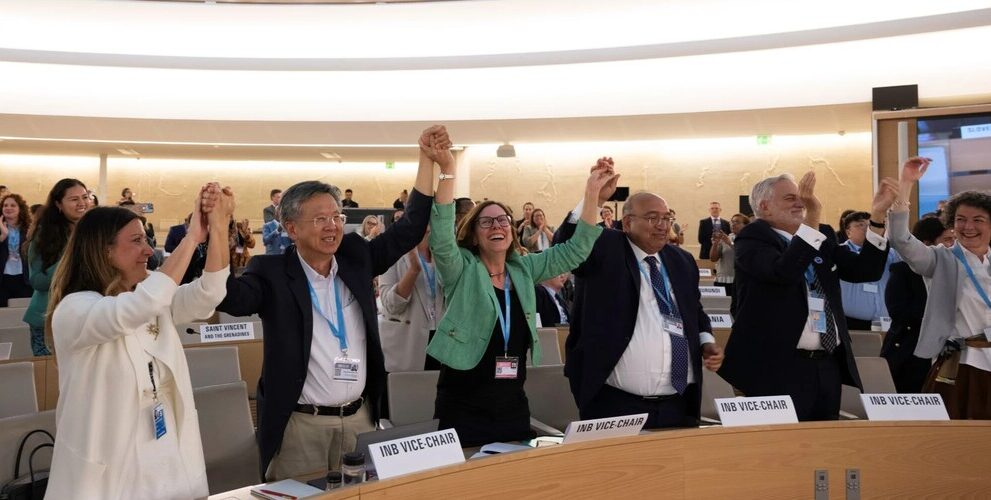New WHO accord promises fairer, faster response to future pandemics
Adopted by consensus at the 78th World Health Assembly, the deal follows three years of pandemic-era negotiations
Author
Author
- admin / 9 months

- 0
- 4 min read

Author
Geneva: In a landmark move aimed at strengthening global defences against future pandemics, the World Health Organization (WHO) member states on Monday formally adopted by consensus the world’s first pandemic agreement. The decision, taken at the 78th World Health Assembly in Geneva, marks the culmination of over three years of intense negotiations triggered by the gaps and inequities exposed during the COVID-19 pandemic.
“The world is safer today thanks to the leadership, collaboration and commitment of our Member States to adopt the historic WHO Pandemic Agreement,” said WHO Director-General Dr. Tedros Adhanom Ghebreyesus. Calling it “a victory for public health, science and multilateral action,” Dr. Tedros noted that the agreement “will ensure we, collectively, can better protect the world from future pandemic threats.”
The agreement was adopted following a vote in committee on Sunday, where 124 countries voted in favour, none opposed, and 11 abstained. It was formally approved during a plenary session of WHO’s decision-making body on Monday.
Dr. Teodoro Herbosa, Secretary of the Philippines Department of Health and President of this year’s Assembly, said the negotiations were guided by a spirit of urgency and global cooperation. “Starting during the height of the COVID-19 pandemic, governments from all corners of the world acted with great purpose, dedication and urgency… Now that the agreement has been brought to life, we must all act with the same urgency to implement its critical elements,” he said.
He emphasized that the treaty includes “systems to ensure equitable access to life-saving pandemic-related health products.” Dr. Herbosa added: “As COVID was a once-in-a-lifetime emergency, the WHO Pandemic Agreement offers a once-in-a-lifetime opportunity to build on lessons learned from that crisis.”
A Blueprint for Future Preparedness
The pandemic agreement establishes principles and tools for improved international coordination in pandemic prevention, preparedness, and response. Key provisions include ensuring equitable and timely access to vaccines, therapeutics, and diagnostics, particularly for developing countries.
Importantly, the agreement respects national sovereignty, with a specific clause stating: “Nothing in the WHO Pandemic Agreement shall be interpreted as providing the Secretariat of the World Health Organization, including the Director-General of the World Health Organization, any authority to direct, order, alter or otherwise prescribe the national and/or domestic law… or to mandate or otherwise impose any requirements that Parties take specific actions, such as ban or accept travellers, impose vaccination mandates… or implement lockdowns.”
What’s Next
Member States also agreed to begin negotiations on a Pathogen Access and Benefit Sharing system (PABS) through an Intergovernmental Working Group. This process will be considered at the next World Health Assembly. Once the PABS annex is adopted, the full agreement will be open for national signature and ratification. It will enter into force after 60 countries have ratified it.
Additional mechanisms proposed under the agreement include a Coordinating Financial Mechanism for pandemic response and a Global Supply Chain and Logistics Network (GSCL). These initiatives aim to ensure equitable and timely access to health products during emergencies by “remov[ing] barriers and ensur[ing] equitable, timely, rapid, safe, and affordable access to pandemic-related health products for countries in need.”
Pharmaceutical manufacturers participating in the PABS system will be expected to provide WHO with “rapid access targeting 20% of their real-time production” of essential medical products during a pandemic. Distribution will be guided by public health risk and need, with a particular focus on developing nations.
The pandemic agreement is only the second international legal instrument to be negotiated under Article 19 of the WHO Constitution, the first being the WHO Framework Convention on Tobacco Control, adopted in 2003.
“It is also a recognition by the international community that our citizens, societies and economies must not be left vulnerable to again suffer losses like those endured during COVID-19,” Dr. Tedros said.
Also read: WHO’s GAP-CTS Plan Aims to Make Clinical Trials Inclusive









